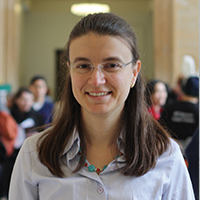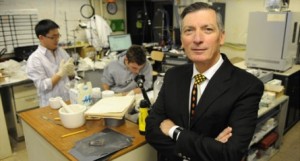 Electrochemistry is the magic that binds together the many fields that excite Professor Bilge Yildiz, ECS Awarded Life Member and recipient of the 2012 ECS Charles W. Tobias Young Investigator Award—and invited speaker in the 241st ECS Meeting Symposium I05: Mechano-Electro-Chemical Coupling in Energy Related Materials and Devices 4. Prof. Yildiz was named a 2021 Fellow of the American Physical Society for “innovative contributions to understanding and manipulating ionic defects and charge transport at electro-chemo-mechanically coupled oxide interfaces and devices.” (more…)
Electrochemistry is the magic that binds together the many fields that excite Professor Bilge Yildiz, ECS Awarded Life Member and recipient of the 2012 ECS Charles W. Tobias Young Investigator Award—and invited speaker in the 241st ECS Meeting Symposium I05: Mechano-Electro-Chemical Coupling in Energy Related Materials and Devices 4. Prof. Yildiz was named a 2021 Fellow of the American Physical Society for “innovative contributions to understanding and manipulating ionic defects and charge transport at electro-chemo-mechanically coupled oxide interfaces and devices.” (more…)
 According to The Verge, MIT is investing $1 billion into an AI college due to an ongoing drought of AI developers and researchers. The hope is that the new college, The MIT Schwarzman College of Computing, will act as both a global center for computing research and education, and an intellectual foundry for powerful new AI tools, according to MIT President L. Rafael Reif.
According to The Verge, MIT is investing $1 billion into an AI college due to an ongoing drought of AI developers and researchers. The hope is that the new college, The MIT Schwarzman College of Computing, will act as both a global center for computing research and education, and an intellectual foundry for powerful new AI tools, according to MIT President L. Rafael Reif.
The new college will train students from a broad range of disciplines and fields, like biology, chemistry, physics, politics, history, and linguistics. MIT’s goal with this is two. First, to examine ethical considerations relevant to computing and AI by including diverse perspectives; second, to teach a wide scope of students what they believe is “the bilinguals of the future.” (more…)
MIT Climate CoLab: Seeking High-Impact Climate Change Solutions
Posted on April 6, 2016 by Amanda Staller The Massachusetts Institute of Technology (MIT) Climate CoLab is currently running a series of contests where people all over the world can work with experts and each other to develop climate change solutions.
The Massachusetts Institute of Technology (MIT) Climate CoLab is currently running a series of contests where people all over the world can work with experts and each other to develop climate change solutions.
The waste management contest is now open. We are seeking practical proposals to reduce greenhouse gas emissions from waste and waste management that can be rapidly implemented, scaled-up and/or replicated. We especially encourage proposals that address national (e.g. Intended Nationally Determined Contributions or National Adaptation Plans) and/or sub-national strategies to address the challenges of climate change and aim to help countries, states, and communities implement those strategies.
The Judges’ and Popular Choice Winners will be invited to MIT to present their proposal, enter the Climate CoLab Winners Program and be eligible for the $10,000 Grand Prize. All award winners will receive wide recognition and visibility by the MIT Climate CoLab. See last year’s conference. Entries are due May 23, 2016. Early submissions welcome — entries can be edited until the contest deadline.
Even if you don’t have new ideas yourself, you can help improve other people’s ideas and support the ones you find most promising. Visit the CoLab to learn more.
Researchers around the world are in a scientific race to develop a near-perfect lithium-ion battery, and a startup from the Massachusetts Institute of Technology (MIT) may have just unlocked the secret.
In 2012, Qichao Hu founded SolidEnergy – a startup that grew out of research and academics from MIT. Qichao started with battery technology that he and ECS member Donald Sadoway developed.
Now, the company is claiming to have built a lithium-ion battery that could change battery technology as we know it.

Sadoway’s research seeks to establish the scientific underpinnings for technologies that make efficient use of energy and natural resources in an environmentally sound matter.
Credit: MIT
Donald R. Sadoway – a prominent member of The Electrochemical Society and electrochemist at the Massachusetts Institute of Technology in Cambridge – has led a team of researchers at MIT to improve a proposed liquid battery system that could help make sources of renewable energy more viable and prove to be a competitor for conventional power plants.
This from MIT News:
Sadoway, the John F. Elliott Professor of Materials Chemistry, says the new formula allows the battery to work at a temperature more than 200 degrees Celsius lower than the previous formulation. In addition to the lower operating temperature, which should simplify the battery’s design and extend its working life, the new formulation will be less expensive to make, he says.


